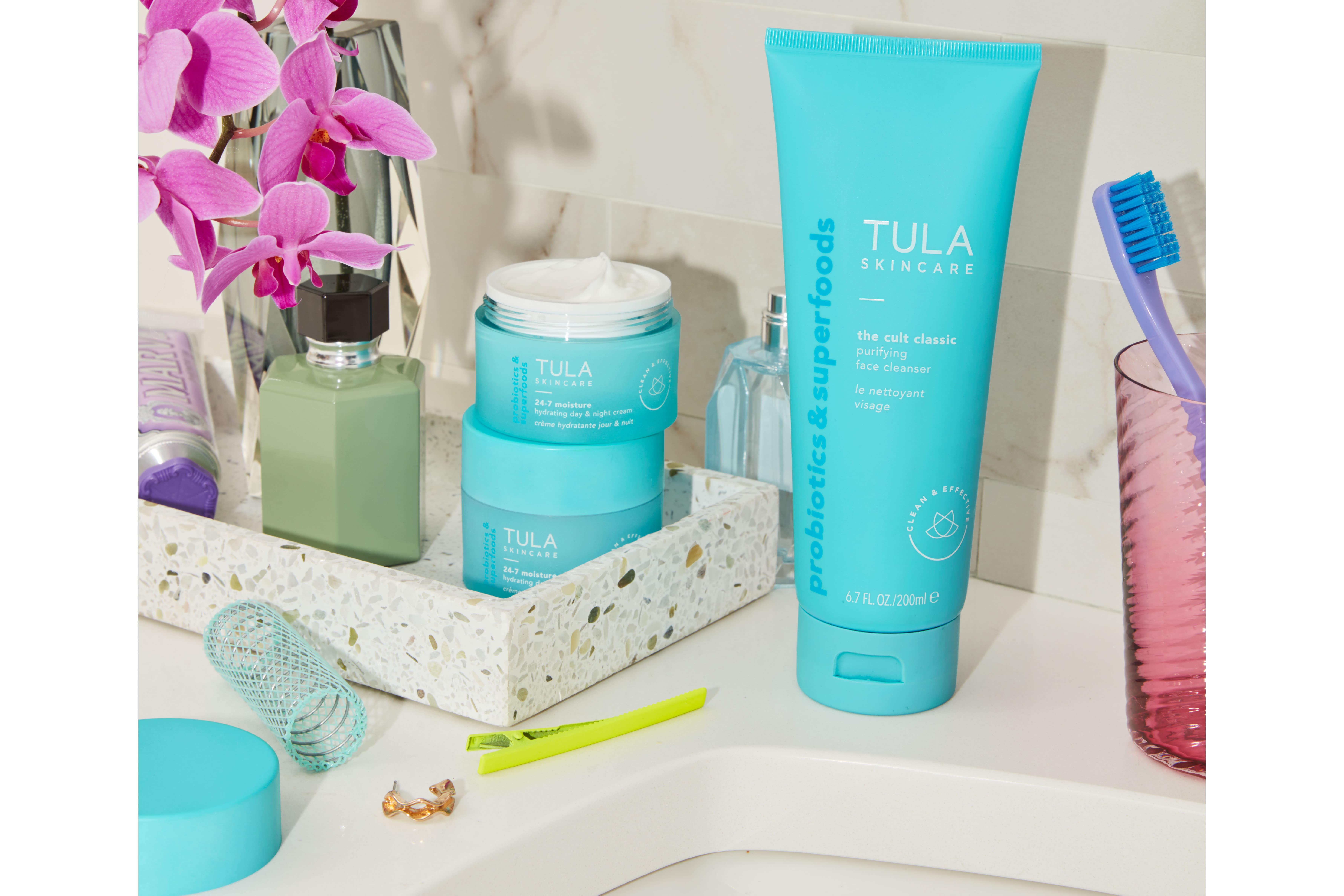Source: TULA
The rise of virtual hangouts and work meetings hasn’t been enough to stop the battering of the beauty industry as the COVID-19 outbreak has largely put in-person activities on hold.
But there’s been a bright spot — the clean beauty market. Purveyors in the space generally offer products free of toxic chemicals and other undesirable ingredients like sulfates and parabens.
Tula, a New York-based skincare company, has benefited from the trend and is now trying to keep up with demand. Tula posted a 400% increase in April sales compared with the year prior — the best April in its six-year history —and double its sales from March.
“I think what we’re seeing is that consumers are staying at home and they’re investing in health and wellness even more,” said Tula CEO Savannah Sachs in a CNBC interview. “We’re seeing really, really great demand across the country.”
Tula was founded in 2014 by Dr. Roshini Raj a NY-based gastroenterologist and wellness expert, Ken Landis, co-founder of Bobbi Brown cosmetics and Dan Reich, a tech entrepreneur, and writer. The company gained traction early on as one of the first successful direct-to-consumer (DTC) clean beauty brands with health-centered ingredients including superfoods such as fruit and grain extracts, as well as probiotics which have been touted for their hydration benefits.
Since February, the privately-held company said sales of its signature skincare bundles have tripled, noting more first-time customers are investing in multi-step skincare routines and thus more products as a result. The brand is benefiting from having a social media-driven demographic with 75% of its customers falling under the age of 35.
Source: TULA
While Tula declined to provide exact revenue figures, the company notes that the surge of online sales in April was primarily driven by new customers and record month-over-month growth in the size of online orders.
And, Tula is not alone.
Store closures and social restrictions around COVID-19 have dragged prestige beauty sales down 14% this year, while skincare within the natural beauty segment has risen 11%, according to NPD, a market research firm that tracks consumer trends. That adds to a $140 billion haul for the broader skincare industry last year.
“Clean (beauty) is something already that we were saying is going to be important to watch,” said Larissa Jensen, vice president and beauty advisor at NPD. “I believe that the circumstances today have only accelerated that conversation and amplified the importance of it.”
Jensen also notes that despite the clean beauty category making up a mere 15% of the $455 billion dollar beauty industry “the fact that it’s grown double-digits in a double-digit declining time period for the whole industry is telling.”
The impact can be seen clearly through the lens of social media.
Biossance, another popular direct-to-consumer clean skincare line, gained mass appeal through its marquee plant-based products, eventually making its first brick-and-mortar debut in Sephora back in 2017. In the past 30 days, the company’s verified Instagram page has gained more than 22,000 new followers.
Drunk Elephant, another cult-favorite clean skincare line sold to Japanese beauty giant Shiseido last October, has also seen explosive social media growth, adding 62,000 new Instagram followers in April.
Tula has a comparatively smaller social media footprint, though it did add 12,000 followers in April and says Instagram remains its top marketing channel.
Social media boost
Despite the recent surge in demand, Tula is not exempt from the supply chain disruptions that have weighed on the entire consumer sector.
“I think that for brands and businesses with global supply chains, there was an early indication of the disruption given what was happening in Asia,” said Sachs. “But now where we’re seeing challenges is in our domestic manufacturing partners and also our fulfillment providers.”
Strict social distancing measures and reduced employee capacity within their U.S. warehouses have pushed Tula’s online order processing times out to two weeks. Prior to the virus-related disruptions, those same orders were shipped out in as little as 24 hours.
“The customer is seeing the impact of COVID-19 in terms of shipping delays across all online businesses, including Amazon,” said Sachs. “I think what’s critical for brands and businesses to do is transparently communicate throughout the process to let people know when to expect their order.”
Despite also losing exposure through its wholesale partnerships with retailers such as Ulta and Nordstrom, both of which have temporarily shut their doors, Sachs notes that Tula’s strong ties to the influencer community have helped it recover lost ground.
Tula pays typically young female lifestyle and beauty centered Instagram users who are familiar with the product —a common industry practice — to help drive traffic and raise brand awareness through posts on their personal accounts. The influencers’ follower counts range from just under 2,000 to over 100,000.
“We’re continuing to see influencer marketing be such an incredibly strong and ROI efficient growth channel for us,” she said. “Influencers are a great barometer on this point because they are so close with their community.”
According to a 2019 survey by data marketing company Euromonitor, 80% of respondents believe that health-inspired beauty trends will have the most influence on sales within the next 5 years — that’s up from just under 70% the year prior.
Sachs believes the increase in social media usage combined with strong influencer partnerships is why the company is seeing big sales gains.
“Given that we are still seeing such strong business results, even in the midst of COVID-19, we’re currently hiring,” she said. “We’re doctor founded and we have probiotics as our anchor and differentiated ingredients which we think will be well-positioned coming out of it.”
